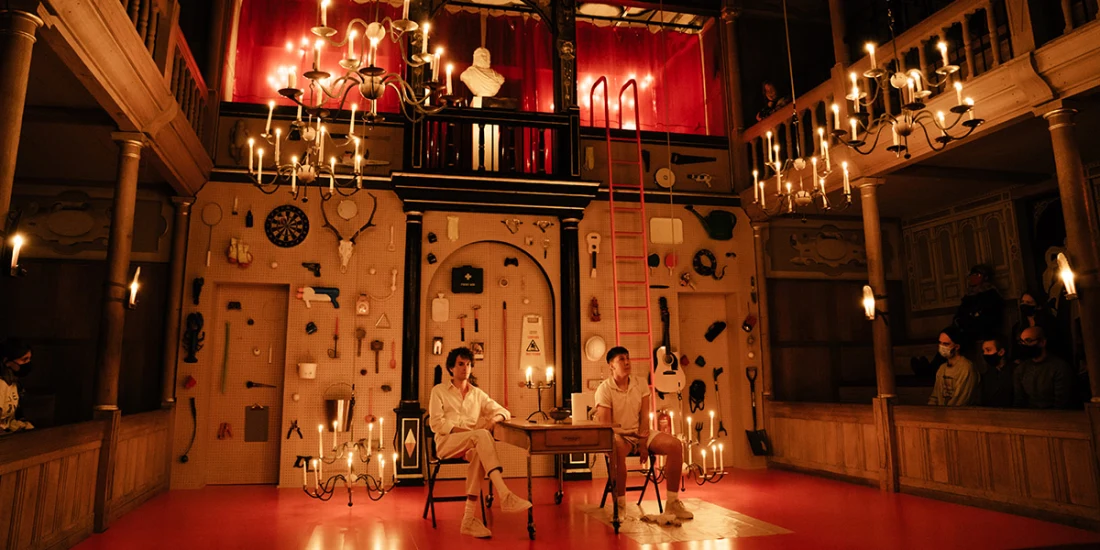'Metamorphoses' review - a collaborative approach offers a fresh take on Ovid
The quartet of actors appear dressed in white for most of the 90 minutes of Metamorphoses, which reopens the Globe's indoor Sam Wanamaker space for the first time since March 2020 and very entertainingly, too. But playgoers would be better advised to take their cue from a red stage floor hinting at the carnage and bloodshed that soon come interspersed amid the deceptive good cheer. Yes, there's an unexpected audience singalong to, of all songs, "American Pie," but the show is more aptly defined by such activities as infanticide, cannibalism, dismemberment, and incest - all conjoined in a folksy, informal method of storytelling that keeps us engaged even when the behaviour on view repels.
Boasting a cast of four, three writers (all Globe playwrights-in-residence), and two directors, Metamorphoses might seem to have taken an awful lot of people to translate afresh the same canonical work from Ovid that, in an entirely different context, won Mary Zimmerman a 2002 Tony Award for Best Director. The approach here taken by co-directors Sean Holmes and Holly Race Roughan is more deliberately knockabout and rough-hewn: latecomers, for instance, get held to account for their tardy arrival in a manner reminiscent of Dame Edna.
But as one or another of the gifted performers appears before us singly or together to chronicle a grab-bag of tales, some well-known (Medea gets a look-in) and others not (the grim fate of the Athenian sisters Procne and Philomela), we are reminded of the perennial appeal of the oral tradition, no matter how startling the tale told. And lest you may fear becoming too ensnared in the unfolding darkness of the psyches on view, the proceedings exist a heartbeat away from a cup of tea proffered to one member of the audience, just as cast member Steffan Donnelly (no slouch himself in the looks department) elsewhere fixes his gaze on a separate audience member whom he has decided is "hot".
The set is decorated with the materials of everyday life - garden tools, household necessities and the like as if to insist on the quality of the quotidian, no matter how many scenarios involve exalted royalty or military heroes engaged in dubious acts, or worse, that might seem to exist a realm apart. (If only their behaviour were unknown to us mere mortals.) At one point we watch a piece of statuary get rent from its base and replaced, a nod to our vexed socio-political present that has made remembrance itself into a seemingly ever-charged gesture.
Scarcely have proceedings begun with two gods, Juno and Jupiter, appearing dressed in bathrobes before talk devolves to men's eyes being boiled in oil and which of the two genders gets more out of sex. (Women seemed to claim that for themselves at the performance attended.) The landscape that follows is one of rape and severed tongues and a child being fed to a parent in a manner worthy of Titus Andronicus, and Donnelly at one point thrillingly unleashes his inner crow - a sound effect I would imagine isn't widely taught these days at drama school.
The authors are Sami Ibrahim, Laura Lomas, and Sabrina Mahfouz, and their freewheeling take on these time-honoured narratives is neatly apportioned amongst the actors. Irfan Shamji in particular has a field day with emotions that turn on a dime, his good cheer ebbing as required across a panoply of tasks that finds him playing Apollo one minute and an Achilles who has "done a lot of dodgy sex stuff" (um, okay) the next. Whatever happened to good old-fashioned love, comes the rhetorical question amid so many who have given themselves over to hate: Fiona Hampton relives afresh the vengeful, child-killing Medea alongside a Hecuba here seen laying before her the body parts of her child's killer.
Charlie Josephine is our comparatively matter-of-fact way into the events on view, pausing until everyone is properly seated and then parsing one circumstance or another, well aware that literary dissection opens unto reports of actual bodily dissections more often than not. Might all this be too bleak for comfort? Not at all, given the welcome imparted by the space itself and by a venture that delights in being able to happen at all in these uncertain times. The casual-seeming attitude that prevails coexists with genuine stage smarts: I wouldn't be surprised to see this Metamorphoses morphing into view before long somewhere else.
Metamorphoses is at the Sam Wanamaker Playhouse to 30 October. Book Metamorphoses tickets on London Theatre.
Photo credit: Metamorphoses (Photo by Helen Murray)
Originally published on
